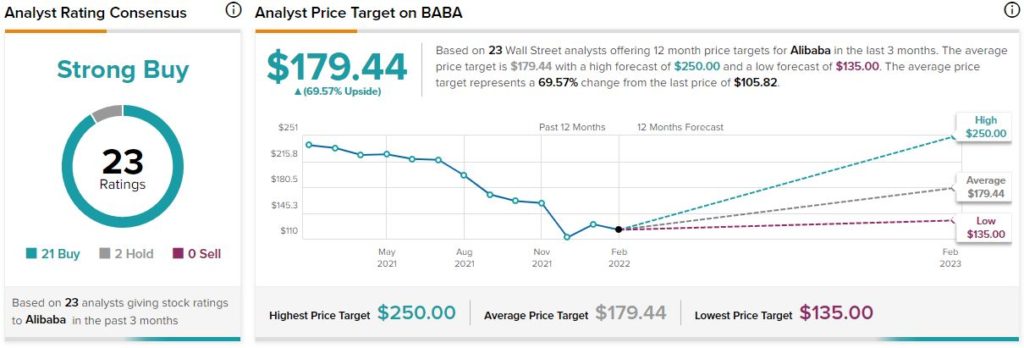China-based e-commerce behemoth Alibaba (BABA) has seen an incredible bout of selling recently. This company’s recent price action has brought BABA stock to 2014 levels, essentially wiping out eight years of growth for this fast-growing company.
Claim 50% Off TipRanks Premium
- Unlock hedge fund-level data and powerful investing tools for smarter, sharper decisions
- Stay ahead of the market with the latest news and analysis and maximize your portfolio's potential
Now, some investors may suggest that Alibaba’s valuation relative to its growth prospects was overly exuberant in the past. Perhaps. However, at around $106 per share, BABA stock is certainly looking enticing to a number of high-profile investors who have recently stepped into this growth stock.
I remain bullish on Alibaba from a long-term perspective. Here’s why I’m one of many who believe BABA stock could be an incredible growth stock priced like a value stock right now.
Alibaba’s Valuation Remains Attractive Relative to Its Growth
Alibaba’s recent price action has brought this stock to around $106 per share, or down more than two-thirds from its peak. This was also the price BABA stock traded shortly after its IPO in the U.S. approximately eight years ago. To suggest this tech stock’s valuation isn’t cheap is utterly ridiculous.
Of course, there are reasons for Alibaba’s recent decline. A continued regulatory crackdown on big tech in China has shifted the paradigm for investors significantly. Investors now don’t know how harsh or how long this crackdown will continue to be. Couple these concerns with other macro geopolitical concerns tied to Russia/Ukraine, and the whole valuation analysis becomes much more complicated.
That said, compared to Alibaba’s growth, this stock is extremely cheap. Revenue growth expectations for Alibaba remain around 31%. At a forward price-earnings ratio of around 13, BABA stock seems incredibly cheap.
Now, the market seems to be pricing in both lower earnings and slower growth to come to some sort of reasonable valuation here. Perhaps Alibaba’s hyper-growth days are done. There are many that can buy some sort of argument along these lines.
However, the more and more one analyzes Alibaba’s cash flow numbers in the context of its valuation, it becomes clear that this is a stock with a payback period of less than 10 years. Indeed, the company’s price-to-cash-flow ratio of 10.6 is one of the lowest of its peers and is generally regarded as a valuation for true, deep-value stocks.
It’s possible that Alibaba’s woes aren’t over yet. However, it’s also possible (perhaps more likely) that BABA stock has been disproportionately beaten up for its risk profile, with little regard for the company’s market position and growth prospects over the long term.
What about That Delisting Risk?
Perhaps the one key driver of Alibaba’s valuation that’s hard to get around, even for the most bullish value investor, is this company’s potential delisting risk. Given the geopolitical situation right now and deteriorating U.S.-China relations, it’s unclear whether capital markets in both companies will continue to play nicely. Many investors seem to believe that a scenario could play out where Alibaba could be delisted from the U.S. exchange.
It’s possible. However, most experts seem to think that in such a scenario, investors would still have access to Hong Kong shares via the over-the-counter markets. Now, should Hong Kong acquiesce to the will of China, perhaps there’s a small probability of a total loss of capital. For many investors, that’s a risk too big to take, even if it’s infinitesimal.
Wall Street’s Take
Turning to Wall Street, BABA stock is a Strong Buy. Out of 23 analyst ratings, there are 21 Buy recommendations and two Hold recommendations.
The average Alibaba price target of $179.44 implies 69.6% upside potential. Analyst price targets range from a high of $250 per share to a low of $135 per share.

Bottom Line
The outlook for Alibaba stock is certainly a difficult one to digest. However, there are many value investors out there, such as Charlie Munger, who are diving into this stock. That’s for a good reason – this company’s fundamental valuation is dirt cheap.
Of course, geopolitical risk is something that’s hard to gauge. This risk will likely remain difficult to gauge moving forward. However, those with a five-to-ten-year investment time horizon (or longer) may do well to snap up some shares near current prices. I believe the shares aren’t likely to remain this deeply discounted for very long, barring some sort of catastrophic event in which most stocks won’t do well.
Download the TipRanks mobile app now
To find good ideas for stocks trading at attractive valuations, visit TipRanks’ Best Stocks to Buy, a newly launched tool that unites all of TipRanks’ equity insights.
Read full Disclaimer & Disclosure
















